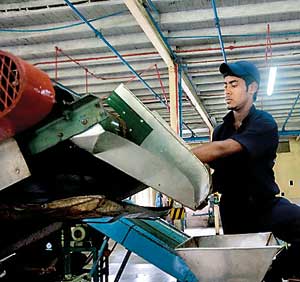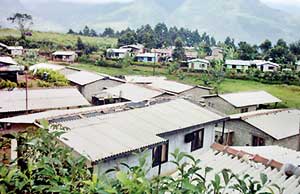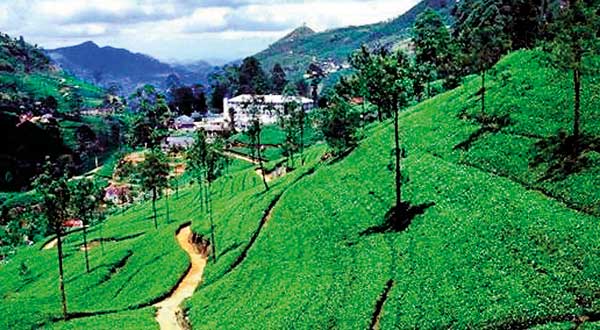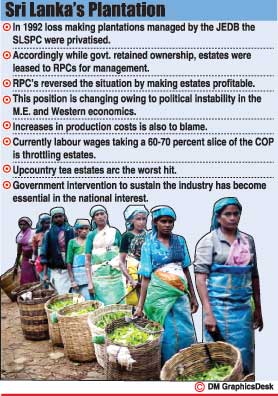Reply To:
Name - Reply Comment
Red flags fly over tea estates; companies bear the brunt of old follies and current uncertainties; but where’s the government?
.jpg)
By Dhyan Abeyagoonasekera
The plantation industry still exerts a great influence on the country’s economy. It has for a long time. And, being a food, drink and ‘natural products’ industry, it can, and should have a long and steady run. Today, after the many see-sawing changes that took place in the past, estates managed by companies on lease agreements are state owned. (There are a few estates that are under the custody of two state owned institutions–the Janatha Estates Development Board and the Sri Lanka State Plantations Corporation.) In the final reckoning, the state bears the responsibility of keeping one of the country’s chief groups of assets vibrant and alive. The Ministry of Plantation Industries and affiliated institutions are the agents responsible to see that the job is done.
.jpg)
Disturbing reality
Long before the government nationalized estates, Ceylon Tea, in private hands, made its mark across the world. However in recent times, tea estates especially in the Up-country areas find that staying alive as viable commercial units has become a nightmare. Production has dropped owing to vagaries in the weather and worse, demand has plummeted owing to upheavals in major buying countries–particularly in the Middle East and the slowing of Western economies. Meanwhile the costs of production of tea have also risen–high labour cost being the unassailable culprit.
When tea estates were in private hands there was machinery within the industry for the regularization and the balancing of workers’ wages and their out puts (productivity). And to all intents and purposes the systems worked – until the estates were nationalized under the ‘policy’ of a ‘people’s government’. It is doubtful that in-depth studies were conducted before this privatization exercise. It was more the result of a political whim in a Left leaning land reform strategy to win votes against ‘capitalists’ rather than a mode of exercising ‘equitable land distribution’. What transpired after the implementation of such land reforms is painful history. Nevertheless it left its mark.
The land reform fiasco
Finally, after around two decades of a special brand of laisse faire administration the government was coerced to privatize the management of estates. The companies that took on that task were well aware of the nature of the liabilities they had to shoulder, but, it could be assumed they had confidence in handling the estates better than the state – which they did up to a point. But it didn’t take long for bug bears that had proliferated during the state regime to emerge as naughty goblins. Estate workers and their unions had no intentions of giving up the carnival times they enjoyed before and among other successes won  calls for regular wage increases. It is no wonder the cost of production of tea in Sri Lanka is the highest in the global industry.
calls for regular wage increases. It is no wonder the cost of production of tea in Sri Lanka is the highest in the global industry.
It did not take long when such periodical (every two years) wage increases began to erode uncomfortably into estate profits. In recent times workers’ wage packages amounting to about 60-70 per cent of the cost of production burnt holes in balance sheets large enough to place a number of tea estates in the Up-country, Mid-country and also in the Uva district in the red. In the current year also similar situations are common where a great majority of Up-country tea estates keep incurring high losses.
(Undoubtedly, there are other factors that influence costs of production, but the cost of labour is the most worrying.)
If Regional Companies are unable to keep tea estates solvent they will be constrained to think of alternatives; consolidations of estates and factories; restructuring; retrenchment and the cultivation of other crops etc. But in reality they are grasping at straws to avoid drowning.
And, in about 10 months another wage hike is due.
Low productivity
Financial maestros are not needed to point out that the main reason why wage increases have a significant bearing on profits is low labour productivity. From the pioneering days, whether it was in plucking or field or factory work, workers were given quotas to complete [to earn a day’s wage]. This system was fine-tuned later through the medium of the Ceylon Estate Employers’  Federation (CEEF) the Planters’ Association (PA) and its branches in the districts and workers’ unions. But, nationalization saw an end to that. Political meddling and governments accommodating union bosses in their Cabinets led the way to the pampering of workers and baby-sitting unions purportedly to ‘keep industrial peace’ and ‘preserve workers’ rights’ etc. However, the real reason was to preserve pro-government vote banks and popularity to stay in power – at any cost to the country. This style of state management continued amid justified criticism by those who knew better. But they were powerless against the ways of a lumbering self-centred Goliath.
Federation (CEEF) the Planters’ Association (PA) and its branches in the districts and workers’ unions. But, nationalization saw an end to that. Political meddling and governments accommodating union bosses in their Cabinets led the way to the pampering of workers and baby-sitting unions purportedly to ‘keep industrial peace’ and ‘preserve workers’ rights’ etc. However, the real reason was to preserve pro-government vote banks and popularity to stay in power – at any cost to the country. This style of state management continued amid justified criticism by those who knew better. But they were powerless against the ways of a lumbering self-centred Goliath.
In privatized management, this was the package Regional Companies inherited from the government.
No gratitude
It is acknowledged that over the past few decades estate workers have experienced a marked improvement in conditions of living that better those of people living in villages. These run through housing, health,  maternal and child care, working conditions, insurance, retiring benefits, welfare, and education from primary up to higher education. (Several students from estates have entered university and they are being sponsored by plantation companies.)
maternal and child care, working conditions, insurance, retiring benefits, welfare, and education from primary up to higher education. (Several students from estates have entered university and they are being sponsored by plantation companies.)
Unfortunately, there is no identifiable reciprocation to those benefits in the way of production outputs, gratitude, loyalty or a sense of belonging by estate workers who keep ignoring the hands that feed them. With unions in tow, male tea pluckers hardly spend 5 hours at work while women tea pluckers dawdle for 7 to 8 hrs without reaching green leaf norms. In the field, men assigned tasks that can be met in about 5 to 6 hours, do not work for more than 4 hours and leave without completing their work quotas – but they demand and get a full day’s wage – a practice that  originated during state sector management. And today’s managements dare not tighten strings in meeting work targets; everybody is afraid of repercussions that are bound to follow.
originated during state sector management. And today’s managements dare not tighten strings in meeting work targets; everybody is afraid of repercussions that are bound to follow.
The workers’ attitude is: ‘this is all we will do; this is all you will get; take it or leave it’, a stance that is echoed in the industry. The industry, the goose that lays golden eggs is being feathered, marinated, half boiled and roasted by the workers and their unions–the very people who thrive on it–leaving
Regional Companies struggling alone: government interest is negligible in a burning matter.
Devious plans to close shop?
In a situation where the government is seen to be basking in a ‘let things  take their own course’ holiday, people ask questions and form opinions. Recently paddy farmers in the North complained about inadequate irrigation facilities, non-release of water when needed, neglect of fresh water reservoirs etc. They claim that this is a government ploy to reduce paddy cultivation by 50%.
take their own course’ holiday, people ask questions and form opinions. Recently paddy farmers in the North complained about inadequate irrigation facilities, non-release of water when needed, neglect of fresh water reservoirs etc. They claim that this is a government ploy to reduce paddy cultivation by 50%.
Plausible charges of conspiracies are being thrown alongside too. Despite the accusations the government does not react and the public remains in the dark. But there is no smoke without fire. It would be remembered when a former PM stated in Parliament that LTTE terrorists are being trained in India with Indian concurrence, there was a hushed explosion of disbelief and calls to withdraw the statement and tender apologies to Big Brother. But finally, wasn’t he proved right?
Apart from another fear that Sri Lankans may end up as bread eating slaves owing to the browbeating of a government staggering in debt, if Up-country tea estates keep recording financial losses, they will be closed leaving a huge population of unemployed workers and their families chiefly of Indian stock squatting on what is essentially state owned land. Now, what could that lead to?

All eyes are on the chief player
As the chief player, the government should take a firm grip on the regulatory reigns of the plantation industry. State owned means public owned. And it is the responsibility of the government to protect the interests of the people.
In the past, the government was seen only as a heavy-handed intruder when talks between workers’ unions and the Employers’ Federation representing Regional Companies hit a stalemate in wage increase discussions. The requirement is government participation not lopsided infringements that are objectionable.

It is time for the government to get off their back seat ride and take on the mantle of principal conductor of the plantation orchestra in the national interest. And in the current environment of tea, many policy factors need government participation: optimum levels of production to maintain prices; markets and marketing; wage revisions; value added tea; full-employment and excess and shortages of labour; land utility; crop diversification and soil fertility etc. The concern of the moment however is about high labour wages wasting away tea estates. Regional Companies have no answer to the issue. While bearing in mind that workers’ wages and corresponding levels of productivity have limitations, government intervention to ensure that, no-one is hurt due to wage increases is needed NOW, not later. The industry will heave great sighs of relief when the government, as an interim measure, sets the ball rolling to make equitable collaterals in productivity a condition when calls are made for higher workers’ wages.
Regional Companies cannot make it entirely on their own steam. Surely the government can see that.
The writer is a former estate superintendent and author of ‘The Essence of Plantation Management’ published by Vijitha Yapa Publications